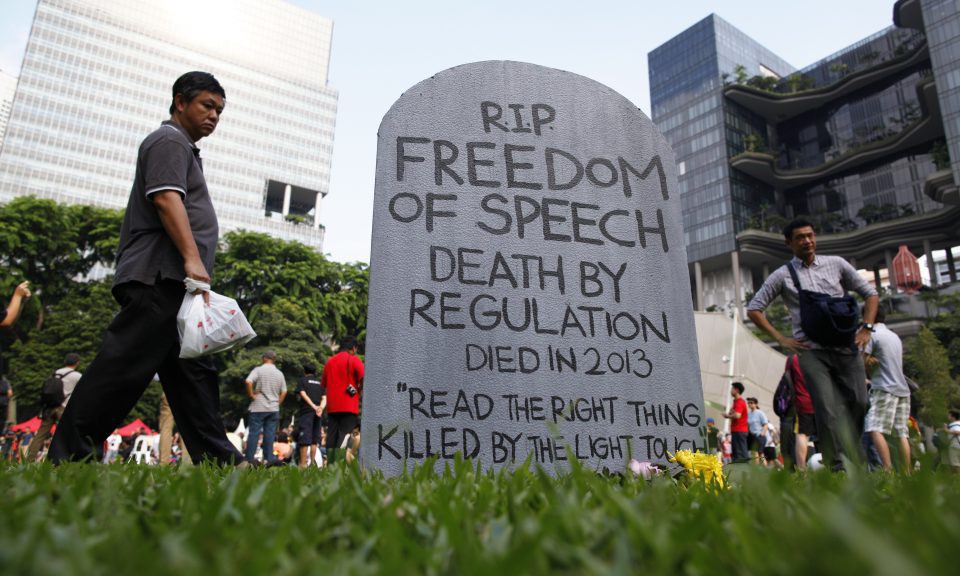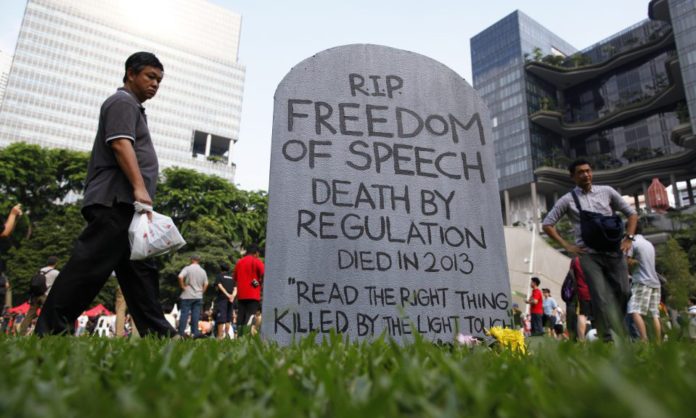SINGAPORE’S government has at long last responded to a Human Rights Watch (HRW) report from 2017, which accused the city-state of “creative repression” in its silencing of activists and political opposition.
The Singaporean Ministry of Law released a statement on Friday regarding HRW’s failure to send representatives to its Select Committee on Deliberate Online Falsehoods, during which some 79 members of civil society were consulted.
Singapore is currently considering the introduction of new legislation to rein in what the government considers fake news.
“HRW’s stance is disappointing, but not surprising. HRW has a pattern of issuing biased and untruthful statements about Singapore,” said the Ministry of Law in a statement.
SEE ALSO: Political space shrinking in Singapore through ‘creative repression’ of activists
“It knows that its Report will not withstand any scrutiny, and has therefore chosen not to come to Singapore to publicly defend its views.”
Said report, entitled Kill the Chicken to Scare the Monkeys, was launched last year at a press conference in Kuala Lumpur, Malaysia, because it would have violated Singaporean legislation that prohibits foreigners participating in “cause-related gatherings” without a police permit.
The report documents limitations on freedom of speech, expression and media in Singapore – particularly under the tiny Southeast Asian nation’s laws regarding public order and scandalising the judiciary. HRW claimed that limitations on activism and criticism of the government had increased in recent years.
“HRW, by its conduct, has shown that it cannot be taken seriously as a commentator or interlocutor on issues relating to Singapore,” added the Ministry of Law, taking the New York-based NGO’s failure to attend as evidence of the report’s “serious inaccuracies”, “misimpressions” and “untrue statements”.

Protesters walk past a mock gravestone that reads “RIP Freedom of Speech” during a protest against new licensing regulations imposed by the government for online news sites, at Hong Lim Park in Singapore June 8, 2013. Source: Reuters/Edgar Su
Vikram Nair, an MP for the ruling People’s Action Party, wrote in a submission to the Select Committee on Deliberate Online Falsehoods that HRW “seems to advocate the use of false and fabricated allegations in political discourse.”
“Singapore looks and feels different from many other countries. We stand out for our efficiency, the educational and social development of our population, the real freedoms that our people enjoy: the freedom from want, the freedom from deprivation, the freedom to walk around without fear of crime,” he wrote.
Critics fear that Singapore’s proposed anti-fake news legislation – the details of which have not yet been announced – will allow the government to further exert its influence over the country’s tightly controlled media.
SEE ALSO: Malaysia and Singapore’s fake news law proposals spark concern
Representatives from Google, Facebook and Twitter have warned the government against introducing new laws during the hearings of the Select Committee on Deliberate Online Falsehoods, stating that existing legislation is adequate to tackle the problem.
Reporters Without Borders (RSF) has also criticised the move, stating that there are already “stacks of draconian laws” in place in Singapore.
“Given the alarming legislative precedents in the city-state, RSF shares the deep concern that Singaporean defenders of the freedom to inform have expressed about this proposed law, which they suspect will be yet another tool for censoring dissent,” said the media watchdog’s Asia-Pacific desk Daniel Bastard in a statement.
On the World Press Freedom Index for 2017 Singapore was ranked 151 out of 180 countries.
{“total”:5,”error”:””,”linkedin”:0,”pinterest”:0,”facebook_total”:4,”google”:0,”stumbleupon”:0,”buffer”:1,”twitter”:0,”vk”:0}





